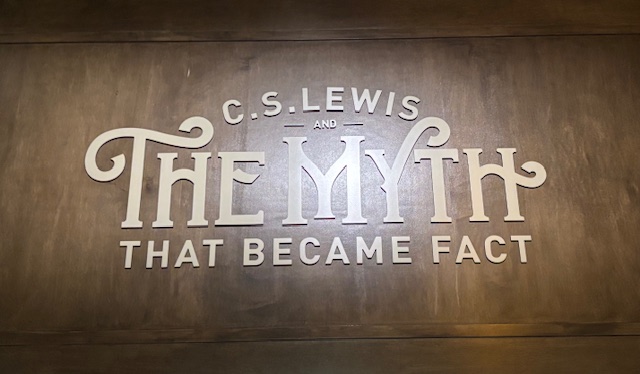By Deanna Huff, Th.M., Ph.D. | May 18, 2025
While working at the Museum of the Bible recently, I walked through the exhibit titled C. S. Lewis And The Myth That Became Fact. The display recounts Lewis’ journey from atheism to faith. Although Lewis grew up knowing Christianity, he rejected it because it resembled the pagan myths. Being an English literature professor, he had read all the great works. For some time, he believed Christianity sat alongside all the myths passed down through the ages. But in his book, Surprised by Joy, he recounts his conversion to Christianity. He wrote, “I admitted that God was God, and knelt and prayed: perhaps, that night, the most dejected and reluctant convert in all England.”[1] Lewis first came to theism and later Christianity. He stated, “Here and here only in all time the myth must have become fact; the Word, flesh; God, Man.”[2] He awoke to the truth that Jesus is God and Christianity a fact.
Only Christianity
Some people, like Lewis, wrestle with belief in God, and even more people have tension with Christianity being the truth among other myths. After Lewis acknowledged that God existed, he continued to search for the true faith. He contended, “There were really only two answers possible: either in Hinduism or Christianity. Whatever you could find elsewhere, you could find better in one of these.”[3] But, he believed Hinduism fell short because it lacked moral and philosophical maturity. Although Hinduism is extremely complex to explain, “Hindus hold the basic belief that every human is divine, yet in present life, humans exist in a state of separation from Brahman. As long as people are ignorant that they are gods, they will continue to exist in this world. After death, the person will be reborn in this world in a different form. Their works in each life will either promote their next life or demote the next life. This happens endlessly until a person realizes their divine nature and is released from this world.
Lewis also believed Hinduism lacked historical evidence. Hinduism has no founder. Instead of one creation story, there are periodic cycles of creation. Brahman is both impersonal and unknowable and is often believed to exist in three separate forms: Brahman—Creator; Vishnu—Preserver; and Shiva—Destroyer. Krishna is considered to be the God that came to earth in the flesh. However, when considering Christianity, there is one narrative story from the beginning to the end. It is the story of God redeeming His people. There is one creation story with Adam and Eve that started the human race. Due to their sin, the race is fallen, but God came in flesh as Jesus Christ to save His people from being separated from Him eternally. Archaeologists have uncovered cities and names of people in the Bible. Discoveries in archaeology add to the credibility of the Bible.
Only the Gospels
Like Lewis, Carolyn Weber wrestled with belief in God. It is the Gospels that revealed the life, death, and burial of Jesus Christ. God who became flesh to save His people. In Weber’s book Surprised By Oxford, the question arises: “Why Christianity?” The response, “Name another religion where an omnipotent, omniscient, and good God becomes human and dwells among us and dies for us. Name another religion that operates according to resurrection and to grace.”[4] The Gospels express the beautiful life of Jesus. Luke attests, “It seemed fitting for me as well, having investigated everything carefully from the beginning, to write it out for you in consecutive order, most excellent Theophilus, so that you may know the exact truth about the things you have been taught.”[5] The Gospels have over 5000 texts that attest to their reliability.
Only Jesus
Lewis recognized that Jesus is unique among the many gods. Jesus’ uniqueness is observed in His claims. He claimed to have authority to forgive sin in Mark 2:7-10, yet in Psalm 103:1-5 and Isa 43:25, the forgiveness of sin belongs to God. Jesus’ assertion to forgive sin reveals His claim that He is God. Jesus claimed he alone could give eternal life, as written in John 6:39-40. Jesus claimed to have the truth in Mark 1:22, Luke 4:32, and John 14:6. Jesus claimed to have authority to judge the world in Mark 14:62. Jesus received worship in John 5:23, 9:38, 20:28-29 and Luke 5:8. To know Jesus is to know God, as found in John 8:19.[6] Only Jesus made these types of claims. Each person should contemplate who this Jesus is.
Conclusion
At different times, Lewis and Weber were professors at Oxford, and both converted from atheism to Christianity. Both moved from Christianity being a myth to Christianity being true. Although Lewis contended that Hinduism and Christianity were the only two religions to consider, Christianity was the path with the historical evidence that affirms the truths of the Bible. The Gospels reflect the accurate account of God who became flesh in Christ Jesus. He died, was buried, and rose again so that believers might have eternal life. It is Jesus who made the claims that He is God, who can forgive our sins, and is coming again to take His people to a new Kingdom. You may be like Lewis and Weber, trying to make sense of this world. Be encouraged to work out your faith with fear and trembling. Seek, and you will find; knock, and the door will be opened, and you may find, just as Lewis did, “Here and here only in all time the myth must have become fact; the Word, flesh; God, Man.”[7]
About the Author
Deanna Huff is a wife and mother. She is passionate about teaching others to share and defend their faith, drawing on 25 years of experience in the field. Her publications include The Prophets’ Use of the Shepherd Motif and Its Contribution to Their Presentation of the Character of God, and she has contributed chapters to Why Creationism Still Matters and Strong Faith.
She works at Museum of the Bible. She is also a speaker who has led seminars for the Baptist General Convention of Oklahoma, the Oklahoma Ladies Retreat, and the State Evangelism Conference. In addition, she taught high school students for ten years at Christian Heritage Academy, covering subjects such as Bible, Universal History, Apologetics and Philosophy.
Deanna earned a Ph.D. in Theology and Apologetics at Liberty University. She holds a Master of Theology in Apologetics and Worldview from Southern Baptist Theological Seminary, a Master of Divinity with Biblical Languages from Southwestern Baptist Theological Seminary, and a Bachelor of Arts from the University of Oklahoma.
Deanna is an active member of Capitol Hill Baptist Church where she co-hosted a podcast called The Analysis with Pastor Mark DeMoss. She also co-hosted a podcast with her daughter Ellie Huff called but why should i care. She and her husband teach an adult Sunday school class, discipling others in the faith.
Notes
[1] C. S. Lewis, Surprised by Joy, Signature Classics Edition (London, UK: William Collins, 1955), 266.
[2] Lewis, 274.
[3] Lewis, 273.
[4] Carolyn Weber, Surprised By Oxford (Nashville, TN: Thomas Nelson, 2011), 387.
[5] NASB Luke 1:3
[6] Timothy Keller, Making Sense of God: An Invitation to the Skeptical, Later Printing edition (Viking, 2016). A portion of the claims of Jesus was extracted from this book.
[7] Lewis, Surprised by Joy, 274.





